You can easily balance your blood sugar with a homemade cinnamon herbal tea. This DIY recipe combines cinnamon sticks, fresh ginger root, and green tea leaves for ideal benefits. Cinnamon regulates blood sugar by increasing insulin sensitivity and slowing food emptying from the stomach. To brew, steep cinnamon in hot water for 8-10 minutes, adding optional ingredients like lemon or honey for flavor. Drink 1-2 cups daily, preferably 30 minutes before meals, to support glucose levels. Remember to consult your healthcare provider if you're taking medications. By exploring complementary herbs and brewing techniques, you'll access even more potential health benefits.
Key Takeaways
- Cinnamon tea regulates blood sugar by increasing insulin sensitivity and slowing food emptying from the stomach.
- Essential ingredients include cinnamon sticks, fresh ginger root, and green tea leaves.
- Steep cinnamon stick for 8-10 minutes in water just below boiling (200°F or 93°C).
- Consume 1-2 cups daily, preferably 30 minutes before meals for optimal glucose-regulating effects.
- Optional additions like ginger, lemon, or cardamom can enhance flavor and provide additional health benefits.
Benefits of Cinnamon for Blood Sugar
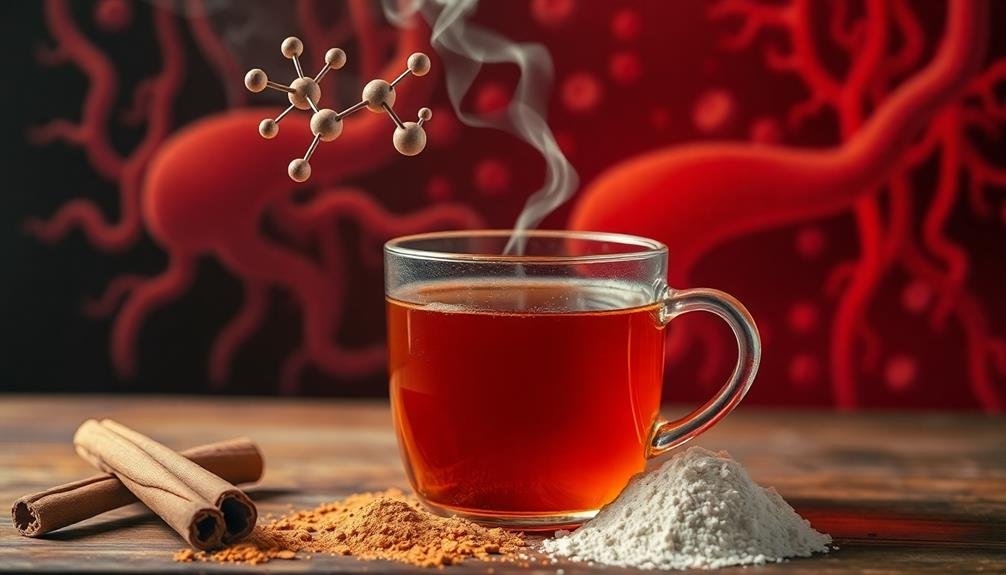
One of the most notable benefits of cinnamon is its potential to help regulate blood sugar levels. If you're looking to manage your blood glucose, incorporating cinnamon into your diet might be a smart move. Studies have shown that cinnamon can increase insulin sensitivity, allowing your cells to use glucose more effectively.
When you consume cinnamon, it may slow down the rate at which food empties from your stomach. This gradual release can help prevent sudden spikes in blood sugar after meals. Additionally, cinnamon contains compounds that mimic insulin, further assisting in glucose uptake by your cells.
Research suggests that consuming just 1 to 6 grams of cinnamon daily can lower fasting blood sugar levels by 10-29%. This effect can be particularly beneficial if you have type 2 diabetes or are at risk of developing it.
However, it's essential to recognize that cinnamon shouldn't replace prescribed medications or a healthy diet and exercise regimen.
You can easily incorporate cinnamon into your daily routine by adding it to your morning oatmeal, smoothies, or by brewing a comforting cup of cinnamon tea.
Essential Ingredients for the Tea
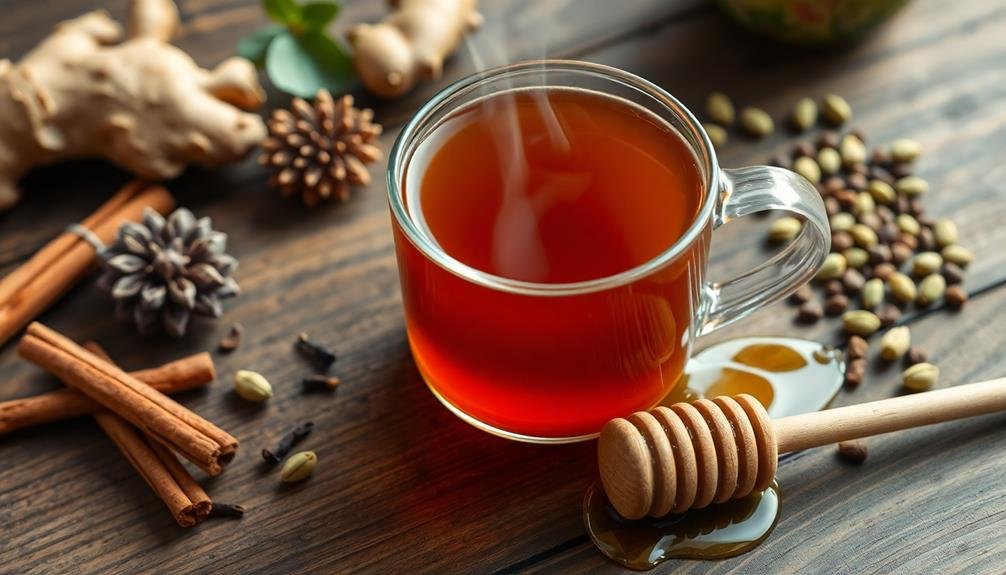
You'll need just a few key components to create your cinnamon herbal tea.
The main ingredients are cinnamon sticks or ground cinnamon and hot water.
To enhance the flavor, you can add optional elements like honey, lemon, or your favorite tea leaves.
[DIRECTIONS]:
Main Tea Components
This cinnamon herbal tea's essential ingredients are simple yet flavorful. The main components are cinnamon sticks, fresh ginger root, and green tea leaves.
Cinnamon is the star of this blend, known for its potential to help regulate blood sugar levels. You'll want to use whole cinnamon sticks rather than ground cinnamon for a richer flavor and easier brewing process.
Fresh ginger root adds a spicy kick and complements the warmth of cinnamon. It's also believed to have anti-inflammatory properties and may aid digestion. Slice or grate the ginger to release its full flavor potential.
Green tea leaves provide a subtle base for the stronger spices while offering their own health benefits, including antioxidants and a gentle caffeine boost. If you prefer, you can substitute with a caffeine-free option like rooibos.
Optional additions include a pinch of black pepper to enhance the absorption of cinnamon's beneficial compounds, and a touch of stevia or honey for sweetness if desired.
These main components work together to create a comforting and potentially blood sugar-balancing beverage that you can enjoy hot or iced.
Optional Flavor Enhancers
In addition to the main components, several optional flavor enhancers can elevate your cinnamon herbal tea. These additions not only improve taste but may also provide extra health benefits. Consider incorporating these ingredients to create a more complex and satisfying beverage.
Here's a table of optional flavor enhancers and their potential benefits:
| Enhancer | Potential Benefits |
|---|---|
| Ginger | Anti-inflammatory, digestive aid |
| Lemon | Vitamin C, antioxidants |
| Honey | Natural sweetener, antibacterial |
| Cardamom | Antioxidants, digestive support |
| Star anise | Antifungal, antimicrobial |
To use these enhancers, add a small amount to your tea during brewing. For ginger, use a thin slice or grate about 1/4 teaspoon. Squeeze in a wedge of lemon or add a few drops of juice. Stir in a teaspoon of honey after brewing. Add 1-2 cardamom pods or a pinch of ground cardamom. For star anise, use one whole star or 1/4 teaspoon ground. Experiment with combinations to find your perfect blend, but remember that moderation is key to maintain the tea's blood sugar-balancing properties.
Step-by-Step Brewing Instructions
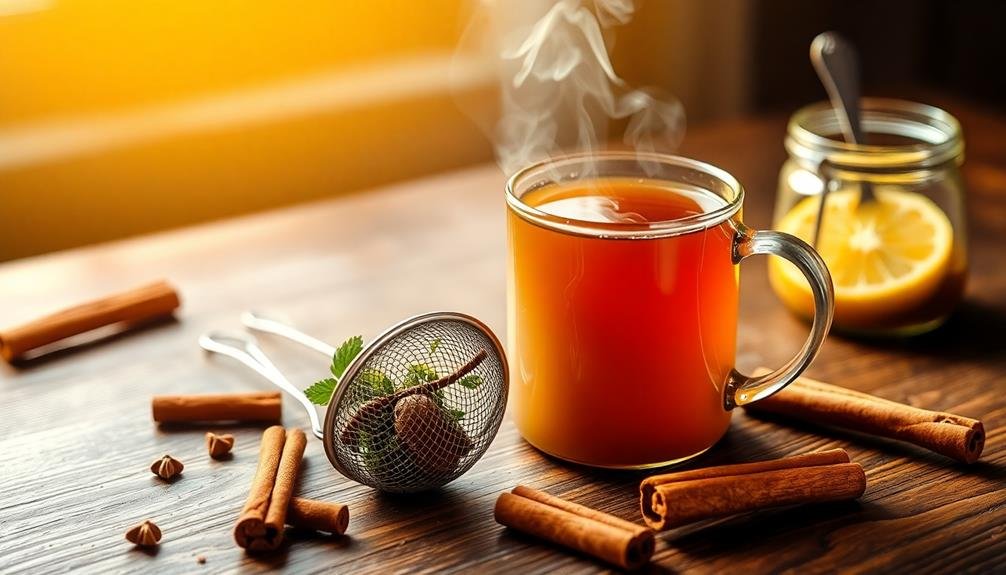
First, you'll need to gather all the ingredients you've prepared for your cinnamon herbal tea.
Next, you'll start the brewing process by heating water to the appropriate temperature for your chosen herbs.
Gather Necessary Ingredients
Before you begin brewing your cinnamon herbal tea, gathering all the necessary ingredients is crucial.
You'll need high-quality cinnamon sticks, preferably Ceylon cinnamon, known for its sweeter flavor and potential health benefits. Collect fresh ginger root, which complements cinnamon and adds a spicy kick. Don't forget to include a few cardamom pods for their aromatic properties and potential blood sugar-balancing effects.
For added flavor and nutritional value, consider incorporating dried orange peel or a small piece of fresh orange zest. You might also want to add a pinch of ground cloves or a whole clove for extra warmth and depth. If you prefer a touch of sweetness, have some raw honey or stevia on hand.
Make sure you have a teapot or a large mug with a tight-fitting lid for brewing. A tea infuser or strainer will be helpful for containing the loose ingredients.
Brewing Process Explained
Your cinnamon herbal tea's brewing process begins with heating water to just below boiling point.
Once your water reaches about 200°F (93°C), remove it from the heat source. Place your cinnamon stick, or 1/2 teaspoon of ground cinnamon if using, into a tea infuser or directly into your mug.
Pour the hot water over the cinnamon, filling your mug about 3/4 full. If you're using a cinnamon stick, you'll want to let it steep for 8-10 minutes to extract the full flavor and beneficial compounds.
For ground cinnamon, 3-5 minutes should suffice. During this time, you can add other ingredients like a slice of fresh ginger or a few cloves for additional flavor and health benefits.
After steeping, remove the infuser or strain out any loose cinnamon. If desired, add a teaspoon of honey or a few drops of stevia for natural sweetness.
Stir well to guarantee all ingredients are thoroughly mixed. Let the tea cool for a few minutes before sipping. You can enjoy this cinnamon tea hot or pour it over ice for a revitalizing iced version.
Optimal Consumption Time and Frequency
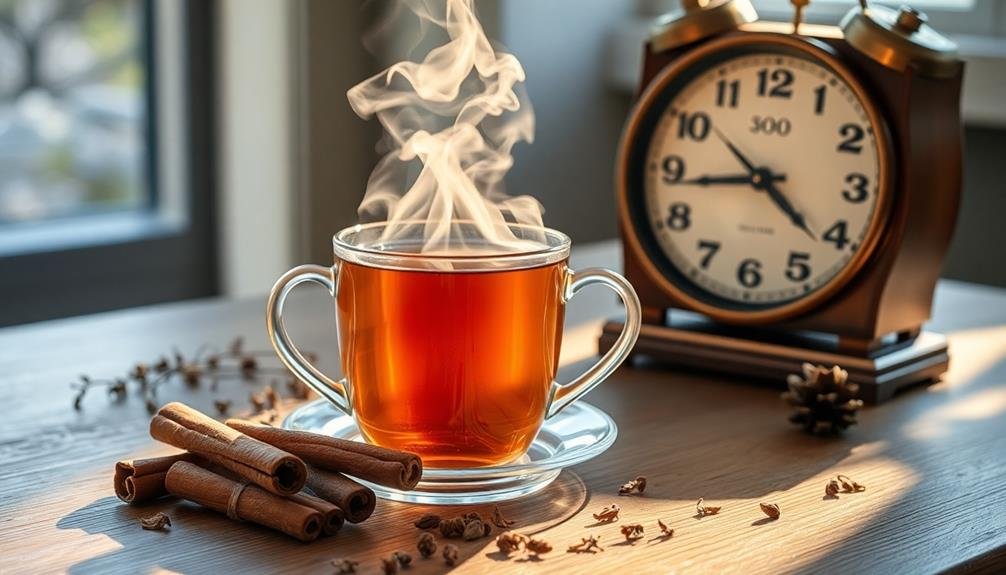
When considering the ideal consumption time and frequency for your homemade cinnamon herbal tea, it's important to balance its potential benefits with your personal schedule and health needs.
Many people find drinking this tea in the morning helps kickstart their metabolism and stabilize blood sugar levels throughout the day. However, you might prefer consuming it between meals to potentially curb cravings and support steady glucose levels.
For best results, aim to drink 1-2 cups daily. Don't exceed 3-4 cups, as excessive cinnamon intake may lead to side effects. If you're using the tea to help manage blood sugar, consider having a cup about 30 minutes before meals. This timing may enhance its glucose-regulating effects.
Be mindful of your caffeine intake if you've added black or green tea to your cinnamon blend. It's best to avoid consuming caffeinated versions in the late afternoon or evening to prevent sleep disturbances.
If you have any underlying health conditions or are taking medications, consult your healthcare provider to determine the most appropriate consumption schedule for your specific situation.
Potential Side Effects and Precautions
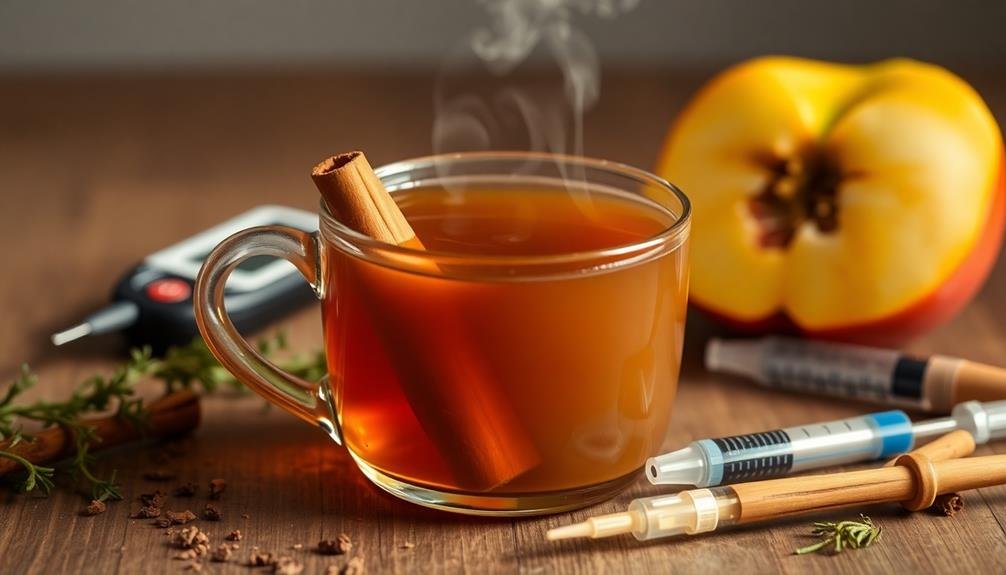
Despite its numerous benefits, cinnamon tea isn't without potential side effects and precautions to be aware of. If you're pregnant or breastfeeding, consult your doctor before consuming large amounts of cinnamon tea, as it may affect uterine contractions.
Those with liver disease should also exercise caution, as cinnamon contains coumarin, which can be harmful in high doses.
If you're taking medication for diabetes, blood thinners, or heart conditions, be mindful that cinnamon may interact with these drugs. It's important to inform your healthcare provider about your cinnamon tea consumption.
Some people may experience allergic reactions to cinnamon, ranging from mild skin irritation to severe anaphylaxis.
Excessive consumption of cinnamon tea can lead to mouth sores, low blood sugar, or digestive issues. Stick to moderate amounts and pay attention to how your body reacts.
If you have a history of kidney stones, be cautious, as cinnamon contains oxalates that may contribute to stone formation.
Complementary Herbs for Blood Sugar
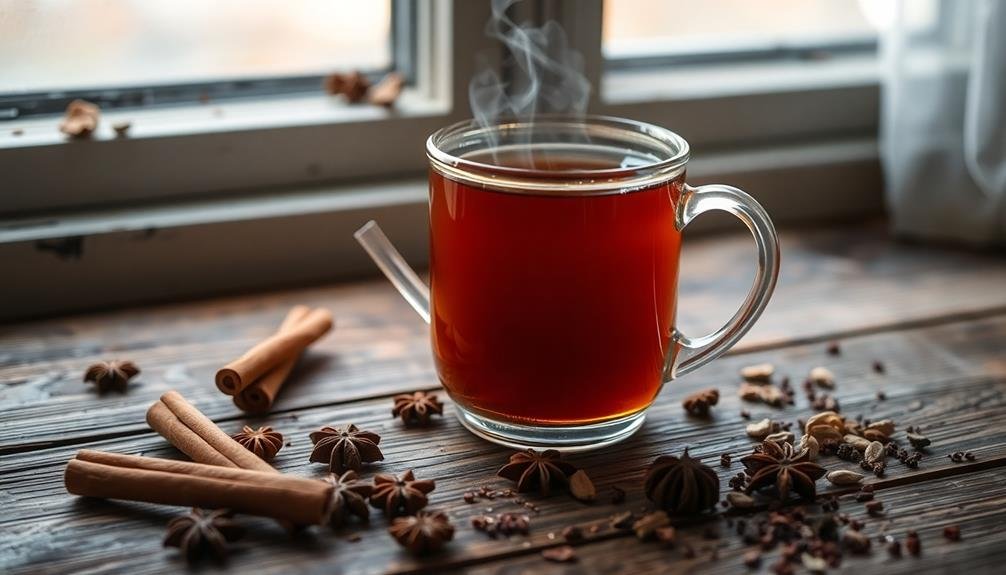
In addition to cinnamon, several other herbs can help manage blood sugar levels. These complementary herbs can enhance the effectiveness of your cinnamon tea and provide additional health benefits.
When incorporating these herbs into your routine, it's important to consult with your healthcare provider, especially if you're taking medications or have existing health conditions.
Consider adding these blood sugar-balancing herbs to your tea blend:
- Fenugreek: This herb contains compounds that slow down the absorption of sugars in the digestive tract, potentially reducing blood glucose spikes.
- Gymnema sylvestre: Known as the "sugar destroyer" in Ayurvedic medicine, this herb may help reduce sugar cravings and improve insulin sensitivity.
- Bitter melon: This tropical fruit has been shown to help lower blood sugar levels by improving glucose uptake and metabolism.
You can experiment with these herbs individually or combine them with cinnamon for a more potent blend.
Start with small amounts and gradually increase as you monitor your body's response.
Frequently Asked Questions
Can Cinnamon Tea Replace Diabetes Medication?
No, cinnamon tea can't replace diabetes medication. While it may help manage blood sugar levels, it's not a substitute for prescribed treatments. You should always consult your doctor before making any changes to your diabetes management plan.
How Long Does It Take to See Results From Drinking Cinnamon Tea?
You'll likely notice subtle effects from drinking cinnamon tea within a few weeks. However, it's not a quick fix. Consistently consuming it over several months may lead to more noticeable improvements in your blood sugar levels.
Is Ceylon Cinnamon Better Than Cassia Cinnamon for Blood Sugar Control?
Yes, Ceylon cinnamon is generally considered better than cassia for blood sugar control. You'll find it's milder and contains less coumarin, a compound that can be harmful in large doses. It's often pricier but worth it for health benefits.
Can Children Drink Cinnamon Tea for Blood Sugar Management?
You shouldn't give children cinnamon tea for blood sugar management without consulting a doctor first. It's not recommended as a primary treatment for kids. Instead, focus on a balanced diet and exercise for your child's overall health.
Does Cinnamon Tea Interact With Other Herbal Supplements or Medications?
You should be cautious as cinnamon tea can interact with certain medications and supplements. It may affect blood sugar levels, blood thinners, and heart medications. Always consult your doctor before combining it with other treatments.
In Summary
You've now got a simple yet powerful tool to help balance your blood sugar naturally. Remember, this cinnamon tea isn't a miracle cure, but it can be a tasty addition to your health routine. Enjoy it regularly, but don't overdo it. Always listen to your body and consult your doctor if you're managing diabetes or taking medications. With consistent use and a balanced lifestyle, you'll be sipping your way to better blood sugar control.

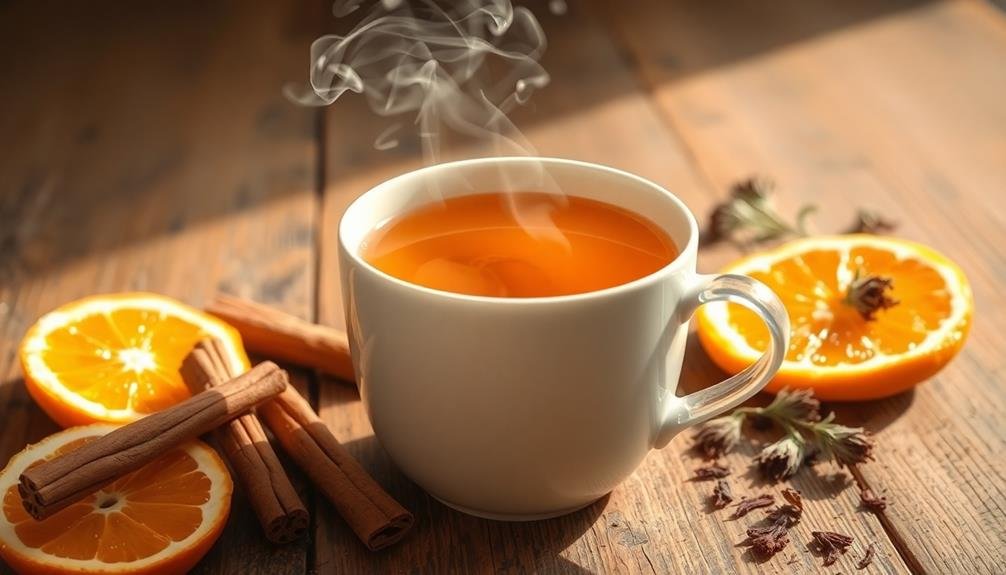


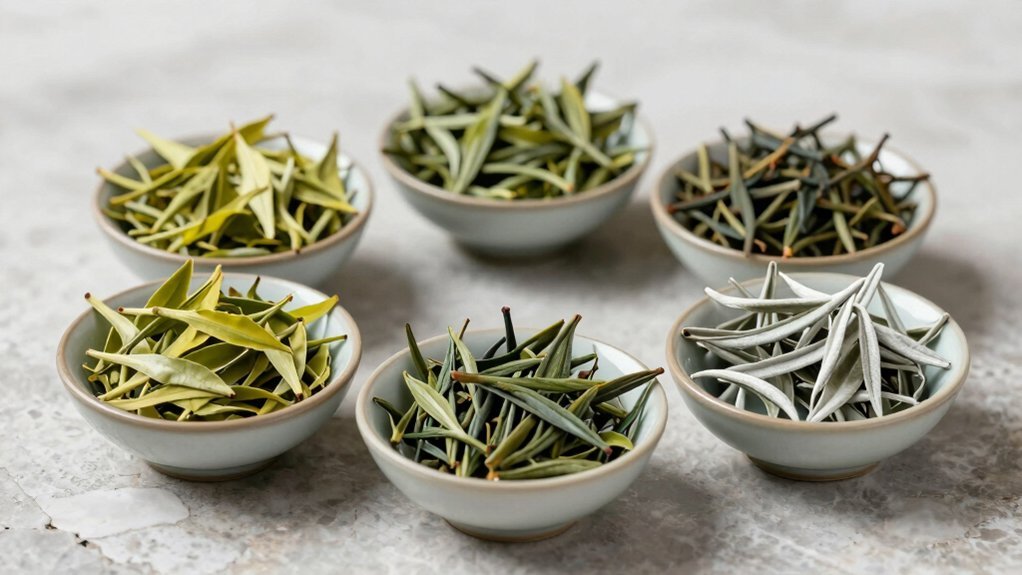
Leave a Reply